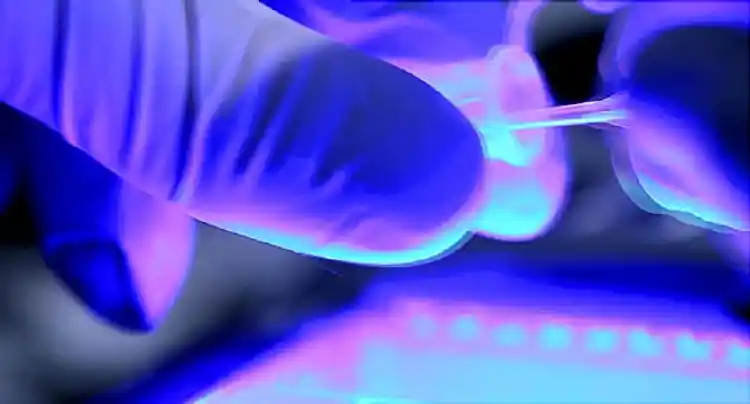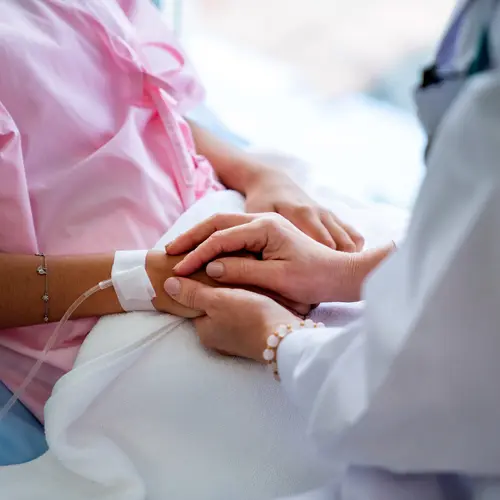Search and Destroy: Targeted Cancer Therapy

Hide Video Transcript
Video Transcript
ROBIN ROBERTS
We've long known that DNA determines much of who we are and what we look like. But did you know scientists are now manipulating an individual's unique genetic blueprint to make cancer therapies even more effective? It's the cutting edge of cancer. JULIE CARLSON
Sometimes those little shore birds are hard to spot. ROBIN ROBERTS
Bob Carlson thought he would spend many relaxing years indulging in his favorite hobby -- BOB CARLSON
I hear a copycat mockingbird ROBIN ROBERTS
-- bird watching. But at age 68, he was told he was going to die. JULIE CARLSON
We both thought because it was stage IV lung cancer that this was going to be it, this was the end. ROBIN ROBERTS: His traditional treatment, 16 months of chemotherapy, was debilitating and painful.
BOB CARLSON
My mouth was bleeding and my nose was bleeding. I was nauseous. I had no strength. Didn't want to get out of my own way. ROY HERBST
So when Bob came to see me, he had had multiple rounds of chemotherapy. And his cancer was still growing. He was really out of options. ROBIN ROBERTS
Bob signed on to a clinical trial headed by Dr. Roy Herbst at Yale's Smilow Cancer Center, one of hundreds of trials across the country testing one of the newest weapons against cancer, targeted therapy, a treatment specifically focused on a gene that affects how cancer cells grow. Everyone knows about chemotherapy and radiation and how debilitating that is. So how does targeted therapy play into that?
MICHAEL SMITH
Well one of the best things about targeted therapy is cancer treatment is so hard because with the chemo, with the radiation, we wipe out the good, and we wipe out the bad. But targeted cancer therapy, we're able to specifically focus in on a genetic mutation that's just in the cancer cell, leaving normal cells largely alone. So with this targeted treatment, people have few to no side effects. ROBIN ROBERTS
In Bob's case, doctors identified a protein called PDL1, which was preventing his immune system from fighting the cancer. By targeting and disabling just that protein, they cleared the way for his own immune system to attack the lung cancer. ROY HERBST
He was able to get on the study. And within weeks, we started to see his tumor shrink. That's more than 3 years ago. Want to take a look at your films?
BOB CARLSON
Sure, why not? ROY HERBST
Even more important than that, his side effect profile was relatively mild. You know, he has a good quality of life. ROBIN ROBERTS
And Bob is not the only one defying odds with targeted therapy. Maria Castellani's breast cancer was so advanced a large tumor had grown on her neck. MARIA CASTELLANI
Wasn't just in my neck because I had several metastases in my lungs, too. ROBIN ROBERTS
She sought out a clinical trial here at Yale University headed up by Dr. Pat LoRusso. Dr. LoRusso's team decoded Maria's genetic code and found specific genes that helped her cancer cells to replicate. They targeted those genes with a drug combination that attacked the part of her DNA, the DNA that caused the replication of Maria's cancer cells. PATRICIA LORUSSO
We saw a response in Maria's neck within a week. It was amazing. The disease just shrunk in front of our eyes, because we could visualize it and see it, the tumors shrinking. ROBIN ROBERTS
Currently, while many of these targeted therapies extend life with little side effects for people like Maria, no one knows how long they will work. And typically the cancer eventually really learns how to circumvent the treatment. PATRICIA LORUSSO
I fear that Maria will eventually not respond any longer to this treatment. That's what typically happens. But for this moment, we've been able to celebrate life together. ROBIN ROBERTS
And for Maria, the gift of more years with her young girls and the knowledge that she is part of something that will eventually help other cancer sufferers gives a sense of purpose to her journey, and something else. MARIA CASTELLANI
Tears of happiness, it's not a sadness. PATRICIA LORUSSO
I don't know if I will see the majority of cancers cured in my lifetime. But I do know that we're transforming an acute disease into a chronic one. ROBIN ROBERTS
And for Bob Carlson and his wife, Julie, every day they hike together to watch their birds, it's a victory against cancer and a sign that many more hopeful targeted treatments against the disease will soon take flight. 